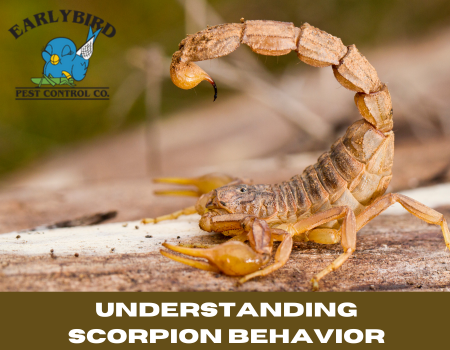Arizona, a state renowned for its beautiful landscapes, also harbors a less desirable resident: the scorpion. While these bugs are fascinating creatures, they can be problematic to homeowners. Understanding scorpion behavior is important for preventing infestations and ensuring the safety of your family.
Understanding Scorpion Behavior
Scorpions are primarily nocturnal creatures, seeking shelter during the day and venturing out to hunt at night. They are attracted to dark, moist environments, often hiding under rocks, logs, or in crevices. In homes, they can be found in basements, garages, and other secluded areas.
- Diet: Scorpions are carnivores, primarily feeding on insects. This makes your home an attractive hunting ground, especially if you have an insect problem.
- Reproduction: Female scorpions give birth to live young, which remain on their mother’s back for a period of time before becoming independent.
- Defense: Defense is of course something to be aware of when it comes to scorpion behavior to keep you and your loved ones safe. When threatened, scorpions raise their tail and sting. Their venom is primarily used to subdue prey, but it can also cause painful reactions in humans.
Scorpion Prevention Tips
While scorpions are a common sight in Arizona, there are several steps you can take to reduce the likelihood of an infestation:
- Seal Entry Points: Scorpions know how to squeeze through small openings. Check your home for gaps around doors, cracks in the foundation and windows, and holes in screens. Ensure that these areas are sealed with weatherstripping or caulk.
- Reduce Moisture: Scorpions thrive in damp environments. Fix any leaks promptly, use dehumidifiers in basements and bathrooms, and ensure proper ventilation.
- Yard Maintenance: Keep your yard clean and clutter-free. Remove piles of wood, rocks, and debris that can provide hiding places for scorpions. Trim back vegetation near your home to reduce potential hiding spots.
- Insect Control: As scorpions prey on insects, controlling insect populations can help deter them. Use effective pest control methods to eliminate potential food sources.
- Lighting: Yellow bug lights can help minimize insect populations around your home, reducing the attraction for scorpions.
Safety Precautions
Even with preventive measures in place, scorpion encounters can occur. Here are some safety tips:
- Shake Out Shoes and Clothing: Before putting on shoes or clothing that has been stored, shake them out to ensure no scorpions are hiding inside as this scorpion behavior is quite common as they look for a dark place to sleep.
- Be Cautious at Night: Scorpions are most active at night. When outdoors, wear closed-toe shoes and long pants.
- First Aid: If stung by a scorpion, seek medical attention immediately, especially for young children, the elderly, or individuals with allergies.
Professional Help
If you’re dealing with a severe scorpion infestation or can’t manage the problem on your own, it’s best to reach out to a professional pest control company. They have the expertise and tools to effectively eliminate scorpions from your home, and that is where Earlybird Pest Control company comes in.
Common Scorpion Species in Arizona
Arizona is home to several scorpion species, each with varying levels of venom toxicity however, understanding the species and scorpion behaviors that are in your area are vital to staying safe. Some of the most common include:
- Bark scorpion: Known for its potent venom, the bark scorpion is a small but dangerous species.
- Striped tail scorpion: Although less venomous than the bark scorpion, the striped tail scorpion can still deliver a painful sting.
Myths About Scorpions
There are many misconceptions about scorpion behaviors. Here are a few common myths:
- Myth: Scorpions glow in the dark.
Fact: While some scorpions may fluoresce under ultraviolet light, this doesn’t mean they glow in the dark.
- Myth: All scorpions are deadly.
Fact: While some scorpion stings can be painful, very few species pose a serious threat to human life.
- Myth: Scorpions climb walls.
Fact: While scorpions can climb smooth surfaces, they typically prefer to stay close to the ground.
When you understand scorpion behavior, implement preventive measures, and take necessary precautions, you can significantly reduce the risk of encountering them in your Arizona home. Remember, safety is paramount, so take the necessary steps to protect yourself and your family.


Recent Comments